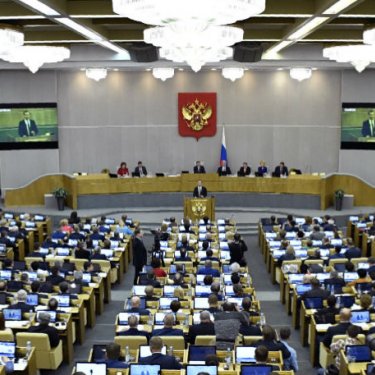Last nail in coffin of Russian Internet freedom

Reporters Without Borders (RSF) urges the Duma to reject two bills that have been approved on first reading and, if adopted, would eliminate much of what remains of Internet freedom in Russia. They would ban software for bypassing the blocking of websites, censor search engines and bring messaging apps under control.
Читать по-русски в PDF / Read in Russian
No less a person than Alexander Bortnikov, the head of the Federal Security Service (FSB), asked legislators to speed passage of the two bills. And they listened. The first reading of both bills was completed in record time and their adoption on second reading is imminent.
“If they take effect, these bills will drive one of the last nails into the coffin of Internet freedom in Russia,” said Johann Bihr, the head of RSF’s Eastern Europe and Central Asia desk.
“By seeking to perfect Russia’s mechanisms of digital censorship and surveillance, these bills trample on the freedoms guaranteed by the constitution and the European Convention on Human Rights. We call on the Duma to reject them on second reading.”
Filling the gaps in Internet censorship
The bill designed to fill the gaps in Russian Internet censorship by targeting the ways used to circumvent website blocking such as VPNs, proxy servers and the Tor network was passed unanimously on first reading on 23 June, two weeks after being submitted to the Duma.
If it becomes the law, the providers of this kind of software would be required to cooperate in the blocking of websites banned in Russia and, if they did not, their own websites would be rendered inaccessible. The same bill would also require search engines to remove all references to sites blocked in Russia.
Bringing instant messaging under control
The other bill, targeting instant messaging services such as WhatsApp and Telegram, was passed on first reading on 14 June, three weeks after its submission to the Duma.
If adopted, the operators of these messaging services would be required to cooperate with Russian mobile phone operators in identifying their users. They would also have to block certain messages at the Russian state’s request and would have to allow the authorities to circulate their own messages.
The messaging services that do not comply with the new requirements could be fined up to 1 million roubles (14,500 euros) under another bill that was passed on first reading on 7 July.
This is not the only pressure currently being put on messaging service operators. Last month’s threat by Roskomnadzor, the federal communications surveillance agency, to block Telegram in Russia led to a widely covered showdown between Telegram founder Pavel Durov and Roskomnadzor chief Alexander Zharov.
Durov continued to refuse to comply with a 2014 law under which “information distribution organizers” have to register in Russia, store all user connection data for six months and make it available for inspection by the Russian authorities on request. He finally agreed to register, but still insists that he will not share user data.
Five less widely used messaging services that had not registered – BlackBerry Messenger, Imo, Line, VChat and WeChat –were blocked in early May as a way of increasing the pressure on the more popular services, which for the time being continue to be spared.
Under the “Yarovaya Law” that was adopted last year, messaging services are in theory required to decrypt individual chats between users at the FSB’s request. But the requirement’s implementation could be postponed because of technical difficulties needing exorbitant outlays.
All-out offensive
A few days ago, President Vladimir Putin signed a law that allows the communications ministry to order the blocking of mirror sites without referring to a judge. So far, this provision concerns only websites violating copyright, but it has nonetheless set a precedent in automating censorship.
These new laws have coincided with President Putin’s adoption in early May of the “2030 Strategy for Developing an Information Society”, which sets guidelines for a “patriotic” Internet in which anonymity is banned for the sake of the safety of its users.
The need to combat terrorism after the suicide bombing in Saint Petersburg in April is also being cited by the authorities as grounds for the pressure on the messaging services. But there is also the backdrop of opposition demonstrations that are drawing many young people and point to a failure of Internet TV propaganda.
Still very free just a few years ago, the Russian Internet has been reined in since the crackdown on the wave of big demonstrations against electoral fraud in 2011 and 2012. Digital companies are not the only targets. Comments or images posted on social networks and even reposts often now result in prison sentences. According to the NGO Agora, 29 jail terms were imposed on Internet users in 2016, twice as many as the year before.
These developments are slowing the development of Russia’s formerly dynamic and innovative digital sector, and are fuelling concern that Russian could fall far behind other countries in this area in the future.
Russia is ranked 148th out of 180 countries in RSF’s 2017 World Press Freedom Index.



